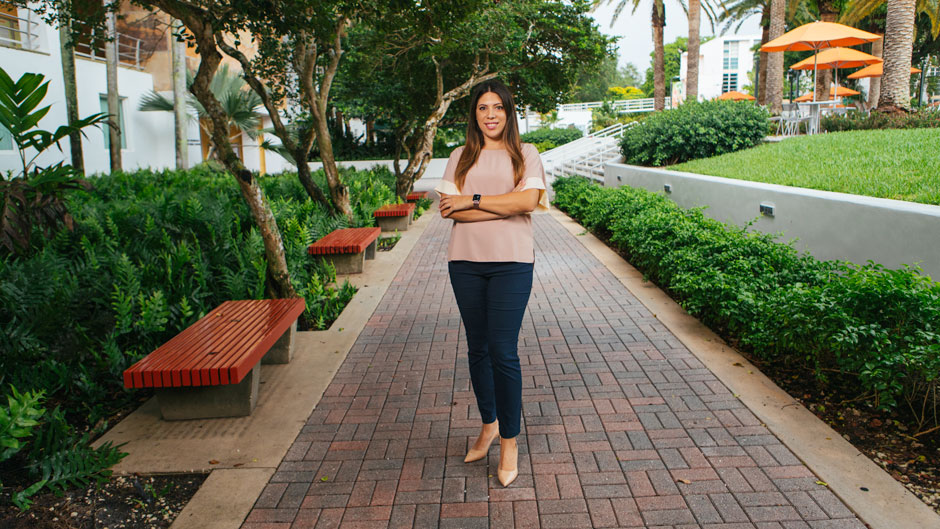Dr. Nadine Mikati
- Lecturer in the Department of Kinesiology and Sport Sciences at the School of Education and Human Development
- Ph.D. in Nutrition and Dietetics from Florida International University
- Registered Dietitian
What can you tell us about the courses you teach?
The exercise physiology curriculum provides vast knowledge in science and the way the body functions. Courses can range from anatomy and physiology to sports psychology, exercise programming as well as nutrition. My classes focus on learning how to lead a healthy lifestyle and how nutrition can relate to athletic performance. Students learn about fad diets, how to read food labels, and what we should be eating. I love that students can apply what they learn in class right away in their own life. That’s the case for most classes in the exercise physiology major since there are clinical laboratory experiences that supplement the theory.
Tell us about your path to becoming a professor?
I knew that I wanted to become a dietitian since high school, but I never thought that I would get a Ph.D. in it! Back then, barely anyone had heard of this field and people always used to ask me “So what will you in work after?” or “What’s that major again?” I liked to be different though.
Why do you teach?
Nowadays, this major is common and the hard part is making the public aware where to find credible sources of nutritional information. Basically, anyone on social media with a lot of followers can claim they are an “expert” and give nutritional advice that might not be all that great, and people might, unfortunately, take that advice. That is why I continued my studies, and one of my passions now is to educate students and the public on healthy eating practices.
Can you share with us why this major is a good option?
I think exercise physiology is a great major for those wanting to continue into healthcare fields such as medical school or physical therapy school. You can also become a certified exercise physiologist by the American College of Sports Medicine. You will be able to train one on one or to instruct groups, and those who are certified are able to develop and implement safe, effective exercise programs and modify them to meet the specific needs of clients.
Do you involve undergraduate students in your research?
Undergraduate students are given the opportunity to assist graduate students in research, data collection, and clinical assessments in the Laboratory of Clinical and Applied Physiology. We also have other research opportunities with our faculty like the THINK program-a community intervention program that our students help with every year.
What options do students have at UM postgraduation?
We have a master’s degree in Exercise Physiology and you can also choose to specialize further in the Strength and Conditioning track or the Nutrition for Health and Human Performance track. These graduate degrees can be completed in as little as one year. Specifically, in the Nutrition track, you will dive deeper into the science behind nutrition and disease in addition to learning how to counsel and provide diet plans to individuals/groups. This track (along with added practicum hours) allows you to become a licensed dietitian in Florida. There’s also an exercise physiology Ph.D. option.
Who should major in exercise physiology?
There are many routes that you can take after earning a degree in exercise physiology. If you have a passion for science, exercise/sports, nutrition, or research, or are interested in any health-related field, then the exercise physiology major may be for you.
Hope to see you in class!

